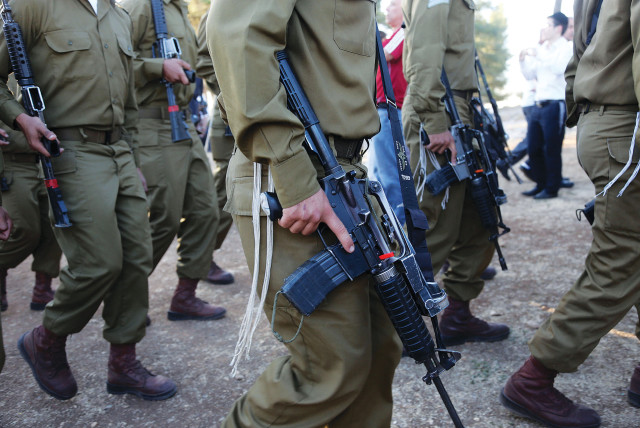Haredi men make noticeable waves in the workforce

As the haredi community navigates new challenges and opportunities, its incremental engagement in both workforce participation and military service is becoming evident.
In our previous feature, we delved into the complex dynamics within the haredi community, exploring the challenges and changes faced by those who step outside traditional boundaries, especially those serving in the IDF.
This week, we continue our exploration into the heart of Israel’s haredi community, where an equally profound transformation is unfolding, driven by the intersection of military service, labor market participation, and evolving societal norms.
This ongoing transformation is significantly reshaping the community’s traditional roles. Central to this change are the intertwined issues of military service in the IDF and the economic engagement of haredi men. These once distinct challenges have been intricately linked by state policies, deeply influencing the haredi community’s interaction with the wider Israeli society.
These developments represent a pivotal shift in the community, where long-held practices meet new societal expectations, forging a path that balances the preservation of religious values with the demands of modern national life.
The pivotal agreement in this narrative, the Torato Umanuto arrangement, was designed to encourage military service among yeshiva students by tying it to their workforce participation. The expectation was that the need to earn a living would drive haredi men toward military service.
However, as we mentioned in last week’s article, the fears associated with army enlistment, particularly the erosion of haredi values and the risk of becoming secular, were so profound that many in the haredi community decided that if the only pathway to the workforce was through the army, they would neither enlist in the military nor enter the workforce.
This stance resulted in tens of thousands who might have entered the workforce choosing not to do so. Contrary to the expectations, many haredi men continued their religious studies, opting out of both military service and the secular job market.
This decision, deeply rooted in faith, inadvertently intensified societal pressure and resentment toward the haredi community, highlighting a growing disconnect between state policies and the community’s deeply held values.
Shift in policy towards haredi population
In the last decade, there has been a significant shift in policy and community dynamics, particularly regarding the haredi population. The government, acknowledging the unique needs and concerns of this community, amended its legislation to allow haredim to enter the workforce at the age of 26 even without having completed military service. More recently, it has been suggested to reduce this to 23 or even 21.
This change in law reflects a growing understanding of the community’s fears and values. Consequently, there has been a marked increase in the number of haredim participating in the workforce. By providing an alternative path to employment, this policy adjustment has enabled the growth of the sector and represents a crucial step toward accommodating the distinct needs of the haredi community. It illustrates the potential benefits of government policies that are more aligned with the diverse values and requirements of various community groups.
Simultaneously, there is a growing movement within the haredi community to embrace those who choose to work, rather than view them as second-class citizens. Organizations are emerging to create Torah-centric haredi communities throughout the country, fostering environments where work and religious life are not mutually exclusive but are harmoniously integrated.
This internal evolution, in conjunction with the legislative changes, is creating a more engaged element within the haredi community. This dual approach is ensuring that while the community becomes more involved in broader society, it does not lose its distinct identity and values. The combination of external legislation and internal frameworks is proving to be a powerful force in shaping a more inclusive and diverse haredi community.
This emerging model, which combines external legislative changes with internal community developments, stands in stark contrast to previous approaches that attempted to impose change from the outside without a deep understanding of the haredi community.
The effectiveness of this new model highlights a fundamental truth: identity, especially one as deeply rooted as that of the haredi community, cannot be altered through external pressure or attack. Instead, it requires a thoughtful, empathetic approach that acknowledges and respects the community’s values and beliefs. By working collaboratively and sensitively with the community, respecting its unique identity and addressing its concerns, real and meaningful change is being facilitated.
This method not only preserves the community’s core values but also enables its members to engage more fully with the wider society in a manner that is harmonious with their way of life. Such a respectful and understanding approach is proving to be far more effective than previous, more confrontational methods, demonstrating that change is most successful when it is built on a foundation of mutual respect and understanding.
The recent developments in the haredi community’s approach to employment, particularly in the wake of the October 7 war, may be seen perhaps as an indication of the beginnings of a transformation in the community’s engagement with the broader Israeli society.
This change is most evident in the community’s participation in fundamental sectors such as agriculture, gardening, and construction, which historically were not the primary focus of haredi employment, which typically was oriented toward urban and modern professions.
An initiative that saw more than 20,000 community members being mobilized for agricultural support was a noteworthy response to the needs arising from the October 7 war. This effort provided valuable manpower to the agricultural sector during a crucial time.
The willingness of these participants to contribute to agricultural tasks across the country, stepping outside their usual roles, reflected a growing awareness of national needs and a readiness to support the country in diverse ways.
This evolving attitude is clearly reflected in the statistics. Initial inquiries at the beginning of the war showed a modest interest in these sectors: 22% in agriculture, 19% in gardening, and 16% in construction. However, a follow-up survey 17 weeks later indicated a notable increase: 30% in agriculture, 23% in gardening, and 20% in construction. Furthermore, there was a significant shift in the community’s normative views.
Initially, 31% supported the idea of haredim working in agriculture, which increased to 41% after 17 weeks – a 10% increase and a 30% rise from the original level. Similar increases in positive attitudes were observed toward gardening and construction.
These figures suggest more than just a change in job readiness; they reflect perhaps a deeper reevaluation of self-perception and societal roles within the haredi community. The growing readiness to engage in traditionally “Zionist” sectors like agriculture and construction represents a profound adaptation, signaling an alignment with broader societal trends and needs.
This emerging transformation, which harmonizes traditional religious commitments with contemporary national challenges, indicates the beginnings perhaps of a shift in the community’s interaction with the rest of Israeli society.
As the haredi community navigates new challenges and opportunities, its incremental engagement in both workforce participation and military service is becoming evident. This subtle yet significant progression is a reminder of the time it takes for societal change to occur, especially in deeply rooted communities.
This evolution, while measured, highlights the complex interplay between maintaining steadfast religious values and adapting to the dynamic needs of the state and its populace. The haredi community’s journey is a testament to the delicate balancing act required to honor deep-seated beliefs while responding to evolving national responsibilities.
This narrative underscores the principle that change, while inevitable, unfolds at a pace that is mindful of the community’s core values and identity.
Jerusalem Post Store
`; document.getElementById("linkPremium").innerHTML = cont; var divWithLink = document.getElementById("premium-link"); if (divWithLink !== null && divWithLink !== 'undefined') { divWithLink.style.border = "solid 1px #cb0f3e"; divWithLink.style.textAlign = "center"; divWithLink.style.marginBottom = "15px"; divWithLink.style.marginTop = "15px"; divWithLink.style.width = "100%"; divWithLink.style.backgroundColor = "#122952"; divWithLink.style.color = "#ffffff"; divWithLink.style.lineHeight = "1.5"; } } (function (v, i) { });

